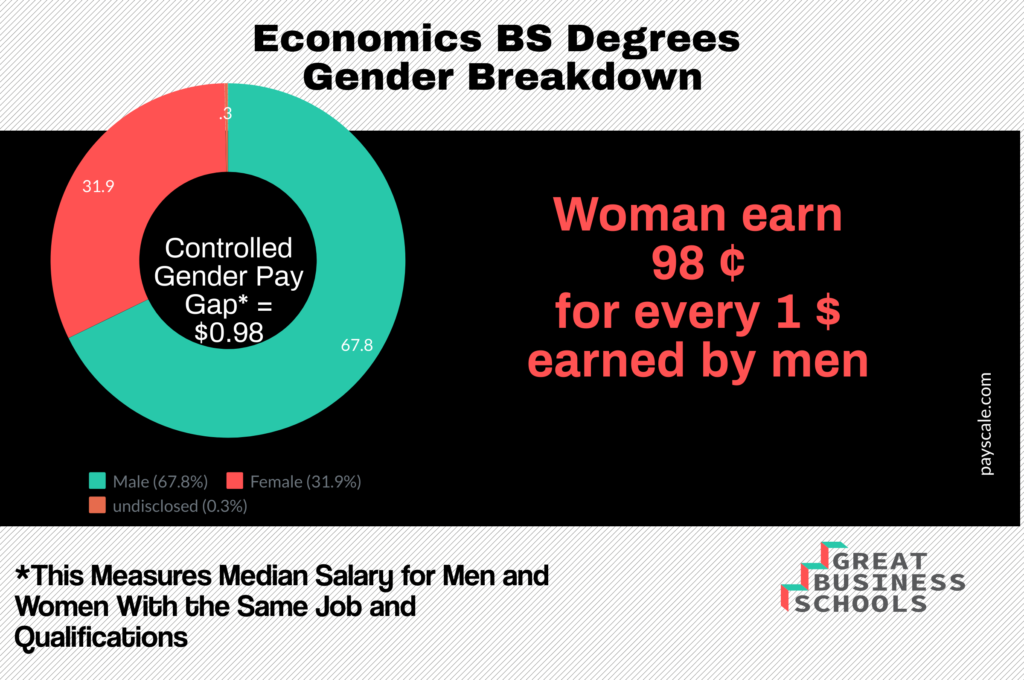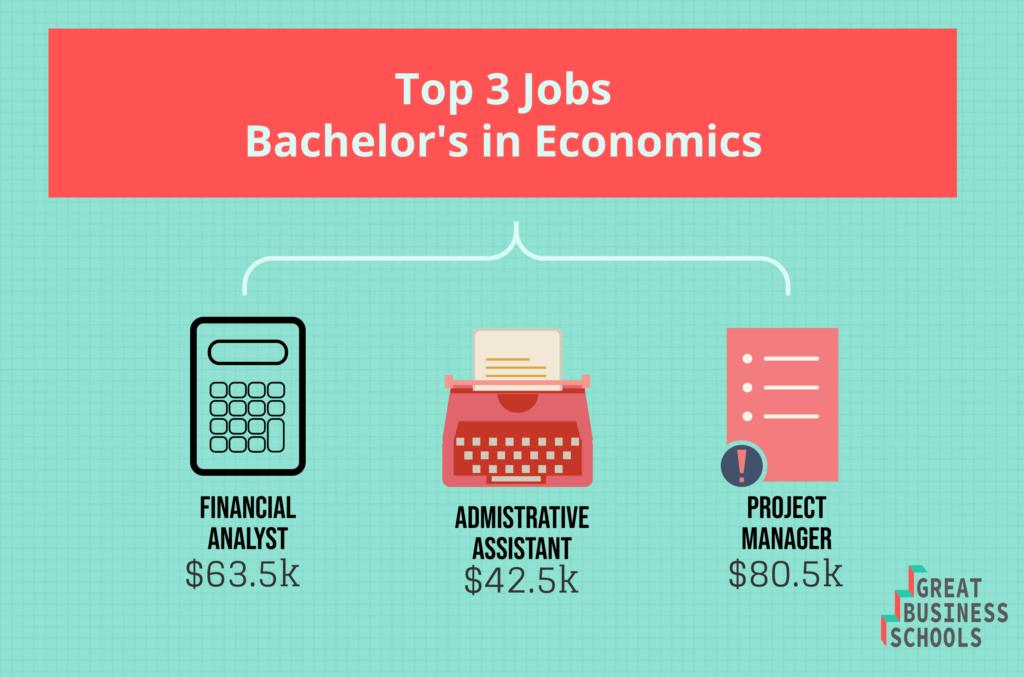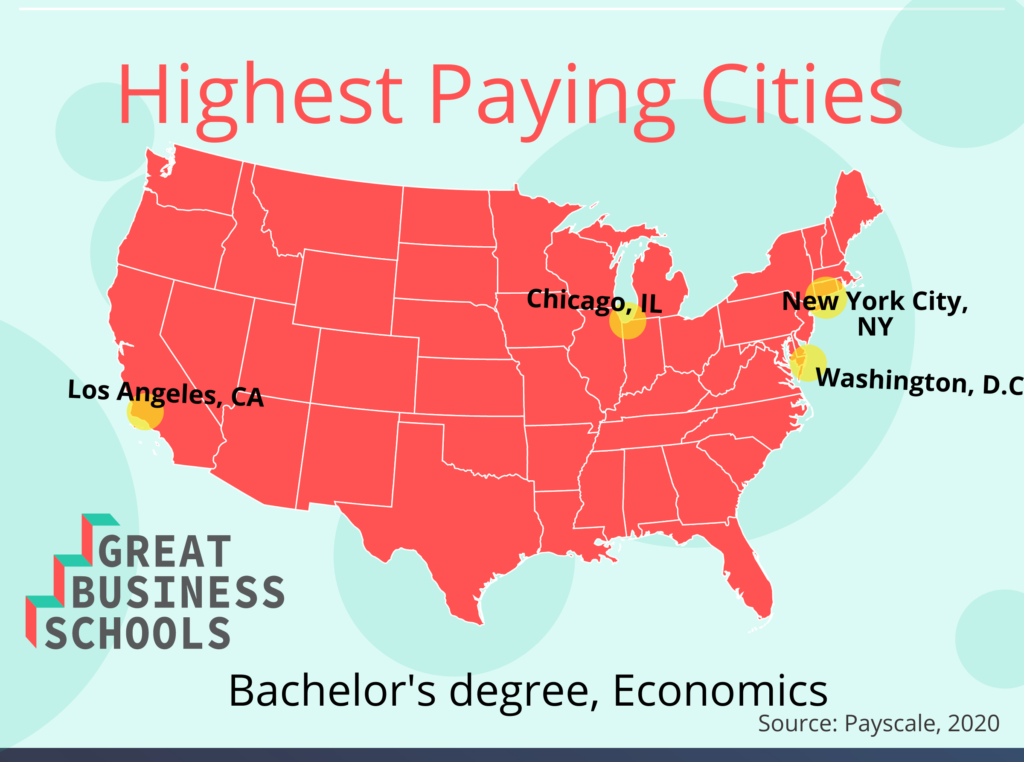You’ve decided to go back to school, and now you’re working to decide what major makes the most sense for your interests and career goals. While you want to be sure you love your career, you also want to major in a field that will result in a financially competitive job offer upon graduation. There are many factors to consider: today’s job market, the pay scale for different majors, room for advancement within certain career fields, and more. If you’re thinking about getting an economics degree, you’re making a smart move. Let’s take a look at some of the different options for what you can do with your economics degree after you graduate.

Featured Programs
What Can I Do With An Economics Degree?
If you’re wondering, “is an economics degree worth it?” the answer is a resounding yes. When you earn your economics degree, you’ll find that you have many different career options, from working in public service to working for private companies. For many people, the ability to work in a variety of industries is one of the factors that’s exciting about what you can do with a degree in economics. Your love for economics and finance can translate into any industry, allowing you to pursue multiple passions within one career. This flexibility also means that no matter how the economy ebbs and flows, you’ll be able to thrive in your career.
What Do You Do With An Economics Degree in the Public Sector?
The answer to the question of, “what can I do with an econ degree?” has many answers. Some people who have an econ degree choose to go into public service, working to meet the needs of the people in their community. Others choose to go into local, state, or federal politics, working to change the financial situations of large public organizations for the better. Some people who want to know, “what can I do with an econ degree?” decide that it makes the most sense for them to work as private contractors, working with private and public companies on a contract basis.
What To Do With Economics Degree – Private Sector
In addition to the world of public service, there are many, many opportunities for people with an economics degree to work in the private sector. If you’re wondering is an economics degree worth it when it comes to the potential for a large salary, you’ll be pleased to know that many jobs that require an economics degree out-perform the national average when it comes to salary. Within private companies, people who have economics degrees often work as economic researchers, accountants, data consultants, financial planners, and more. The answer to what to do with economics degree in the private sector has many answers, and can depend on your interests and geographic location.
Now that you understand the answer to, “what can I do with an economics degree?” let’s take a look at what you’ll want to look for as you choose the school that makes the most sense for your needs. No matter what your personal answer to what do you do with an economics degree, you’ll want to be sure that you choose a school that sets you up for long-term career success in the field of economics.
Accreditation for Business and Economics
When you’re searching for the best school of economics, there are many factors that you’ll want to consider. You’ll need to decide whether you want to take a traditional, in-classroom program or if online education makes more sense for you. You may choose to get started at a community college, and then transfer to one of the best undergraduate economics schools in order to save money. You may consider internship opportunities and career placement in your search for the best economics undergraduate schools. No matter what your criteria for choosing the best schools for economics undergrad for your personal situation, you’ll want to be sure that the program you choose is fully accredited.
Accreditation is important for your future success. When you get a degree from an accredited school, you’re showing future employers that you’ve completed a program that has been vetted by an official governing body in education. In today’s world of many fly by night universities, this is more important than ever. To put it simply: an accredited degree shows that you’ve gained the knowledge necessary to succeed, and that you put in the hard work necessary to earn a legitimate degree.
Regional accreditation is known as the gold standard for school accreditation. While national accreditations are also respected, the top schools for economics undergraduate are likely to have regional accreditation. The The Association to Advance Collegiate Schools of Business also provides highly regarded accreditation for business schools, including those that provide undergraduate economics degrees. When you’re searching for the best economics undergraduate schools, you’ll want to be sure that your school has been accredited by the governing body for that region. Let’s take a look at the accreditations you should look for when you’re searching for top undergraduate economics school to earn your economics bachelors degree.
- Accrediting Commission for Community and Junior Colleges (ACCJC) Western Association of Schools and Colleges
- Higher Learning Commission (HLC)
- Middle States Commission on Higher Education (MSCHE)
- New England Commission of Higher Education (NECHE)
- Northwest Commission on Colleges and Universities (NWCCU)
- Southern Association of Colleges and Schools Commission on Colleges (SACSCOC)
- WASC Senior College and University Commission (WSCUC)

Top Schools For Economics Undergraduate: Why Accreditation Matters
When you’re putting in the hard work to get your education, it’s essential that you’re working with a school that will be positively regarded by potential employers. The best undergraduate economics schools are accredited by their regional accreditation agency, and may have specialized economics accreditation as well. When you’re searching for the best schools for economics undergrad, their accreditation information should be easily accessible on their website. If you’re searching for top undergraduate economics schools and struggling to find their accreditation information, don’t hesitate to reach out to the admissions office to inquire about their accreditation. If you find that a school is not accredited, it’s a good idea to move on to a different school. Having a degree from one of the accredited top schools for economics undergraduate will make it easier for you to find a job after graduation.
Types of Economics Bachelor’s Degrees
When you’re searching for the best economics program for your future career goals, you’ll want to consider two factors: the type of concentration that fits your needs, and whether you want an online, traditional, or hybrid program. First, let’s take a look at the different program formats to help you decide what type of learning experience is the best fit for your needs.
Traditional, Online, And Hybrid Types Of Economics Degrees
The best economics undergraduate program format for you will depend on your preferences, schedule, and budget. Many of the top undergraduate economics programs offer at least some classes online, while other top undergraduate economics programs are still offered only in a traditional setting.
When you go through classes in a traditional classroom setting, you’ll be on campus much of the time. This can be a tough option if you work full time or have other responsibilities outside of school. If you decide to take a traditional program for the best economics undergraduate program for you, you may want to consider living on campus. This can reduce your driving costs and provide you with more time to devote to your studies.
If you’re a non-traditional student, or you simply prefer the convenience of online classes, the best economics program for you may be an online or hybrid option. An online class schedule can give you the best of both worlds – plenty of time to interact with your professor and your classmates, as well as the convenience of working on your own time. If you decide that an online program is the best economics program for you, know that you may have some times that you’re required to be online, either to listen to live lectures or participate in real time discussions. Talk with your potential program advisor about the requirements of the online program you’re considering, allowing you to understand whether it’s a good fit for your schedule.
Types Of Economics Degrees
If you’re wondering, “what type of degree is economics?” know that while it’s a business degree, there are different types of economics degrees. There are several concentrations available within a economics degree programs, including:
- Developmental economics
- Business economics
- Management
- Business administration
- Pre-law economics
Now that you understand the answer to, “what type of degree is economics” and you know the different types of economics degrees concentrations, we’ll move on to certificate programs within economics.
Featured Programs
Certificate Programs in Economics
While earning your economics degree, you may decide to pursue certificates in economics. You can earn certificates in economics both while pursuing your undergraduate degree, or after you finish your undergraduate degree. Certification options while you earn your undergraduate degree may include global economics, financial economics, economic theory, public policy economics, quantitative economics, and more.
You may also choose to earn a graduate certificate in economics online after you complete your undergraduate education. If you’ve already finished your undergraduate degree and are interested in moving into the field of economics, earning a graduate certificate in economics online can be a great way to learn more about economics and show your employer that you’re ready to take on responsibilities in the field.
Your online graduate certificate in economics program may allow you to transfer some of your undergraduate courses in order to speed up the amount of time that it takes you to earn the certificate. When you earn your certificate in economics online, you’re showing your employer that you’re committed to learning new skills, even when it takes extra time and work. It’s a good idea to talk with your employer to ask if they offer a tuition reimbursement program as you earn your certificate in economics online. Many employers are happy to provide full or partial tuition reimbursement as you pursue your graduate certificate in economics, provided that you agree to work with them for a certain amount of time after you finish your degree. Earning your online certificate in economics can be a great way to fast track your career.

Certifications/Licenses
As you earn your degree in economics, you may want to think about earning your certification in economics as well. There are many options to pursue your economics certification online, making it easy for you to start your career while also bolstering your resume. As you go through your undergraduate studies, you’ll be well prepared to earn several economics certifications. Earning an economic certification can help set you above the rest when it comes to applying for jobs.
Economics certifications that you may want to consider include:
- Economic development finance professional
- Chartered economist
- Certified economic developer
As you earn your degree, it’s key to think about getting your certification in economics. Not only can getting your economic certification increase your chances in today’s competitive job market, it can also help you if you decide that you’d like to further your education and apply to graduate school. Getting your economics certification online can help you move forward in both your career and your education.
Careers in Economics
If you’re thinking about getting an economics degree, you’re likely wondering, “what jobs can an economics degree get you?” There are many economics major jobs in today’s market. Since nearly all large companies have jobs for an economics major, you’ll likely find that there are many job options in the industry you’re passionate about.
Let’s take a look at some of the jobs for an economics major that may be a good fit for you.
Job Options For Economics Majors
- Economist – One of the most obvious jobs with an economics major, economists study supply, demand, distribution, and resource production. These economics major jobs exist in many organizations in both the public and private sector. Working as an economist is one of the best jobs to get with an economics degree.
- Accountant – Accounting careers for econ majors are a popular choice. An accountant works to prepare financial documents for an organization, and may also work to ensure the accuracy of financial documents prepared by others. Accounting careers for econ majors are great for those who have excellent attention to detail.
- Market research analyst – This econ majors careers is perfect for econ majors who enjoy studying large trends and are interested in the marketing side of business. This is one of the jobs for economics majors that is likely to be found within a large, for-profit company.
- Financial analyst – Working as a financial analyst is one of the jobs with an economics major that can be done either for an organization or on a contract basis. In these jobs for economics majors, the main task is to provide advice on investments.
- Actuary – These econ majors careers deal with calculating risks. Actuary careers for economics majors help organizations make decisions on when it makes sense to make a risk, and when it makes sense to hold back. These careers with a major in economics are great for people who love working with numbers, and enjoy guiding business decisions.
While these careers are known as some of the best jobs with an economics degree, they’re not the only options. There are many niche jobs for economy majors, and you may find that new careers develop over the time that you go through your education.
Searching for the best careers for economics majors can present you with a lot of information, and it can feel overwhelming to consider all of the options. As you go through your studies, you’ll find that you have many options while figuring out the best careers for economics majors according to your personal preferences. Whether you prefer working with numbers, working with large corporations, or working with individuals, there are many job options for economics majors. Finding the best jobs with an economics degree will require that you take advantage of internships while you go through your undergraduate education. When you’re asking, “what jobs can an economics degree get you?” you’re being smart – it’s important to consider whether the careers for economics majors are a good fit for your career goals. As you can see, the options for careers with a major in economics are myriad.

Salary Expectations in Economics
When you’re deciding whether you want to major in economics, it’s important to consider your economics degree salary possibilities after you graduate. The average salary for economics majors depends on several factors, including your location, the demand for your job, your experience, the budget of your company, and more.
Let’s take a look at the economics degree salary that you can expert to earn on average for several different jobs.
Average Salary For Economics Majors
- Economist – $102,000. Many students who major in economics are working toward the goal of becoming an economist, and this position is often the ultimate goal for people in the field.
- Accountant – $69,000. Working as an accountant allows you to work in any number of organizations, both public and private. Some accountants choose to go into their own business, working to help people with private financial matters.
- Market research analyst – $63,000. This economics bachelor degree salary is on the low end for economic degree starting salary, but the job security makes up for it. This position is
- Financial analyst – $84,000. While this is the average salary of an economics major in this job, this can increase steeply depending on the level of investments you manage.
- Actuary – $102,000. This average salary of an economics major in this position is in high demand, growing at more than triple the rate of other jobs in the United States.
These are examples of economics bachelor degree salary, they do not account for graduate education. Starting salaries for economics majors are typically higher after completing graduate school. While a bachelor degree in economics salary is more than enough to make a comfortable living, there’s room for growth with graduate education.
When you’re searching for your degree in economics salary after you graduate, remember that your economics jobs salary is likely to increase over time. The starting salaries for economics majors are competitive, but can grow fast. Economics jobs are not going anywhere – in fact, the need for many of these careers are growing rapidly. Your degree in economics salary will increase as you spend more time with the company. Your economics jobs salary will also likely increase if you choose to further your education.
It’s important to get an answer to the question, “how much does an economics major make?” Remember, your bachelor degree in economics salary will correlate to the amount of work that you put in. No matter how much time you spend researching questions like, “how much do economics majors make?” or “what is the average salary for an economics major?” the amount of work you do can increase your salary level over time. Your economic degree starting salary can be negotiated, and it’s a good idea to go into your job interview with an idea of the general answer to the question of how much do economics majors make, so that you’re able to ask for an appropriate salary.
Professional Organizations in Economics
As you begin your professional economics career, it’s key that you join professional organizations in order to help you get to know others in your field. Through professional organizations for people in the field of economics, you’ll get to learn about job opportunities, talk with others in your profession, get education in your field, and stay on top of the latest research in economics.
The top professional organizations in economics include:
- American Economic Association
- National Association for Business Economics
- National Economic Association
- Southern Economic Association
- Association of Environmental and Resource Economists
Carrie Morris
Author
Warren Dahl
Editor-in-Chief

